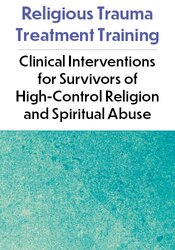
Trending Topics:
×

The demand for therapists specializing in religious trauma has never been higher.
Because today, with access to different perspectives online, many are feeling lost, confused, and even betrayed by their faith. And many who’ve questioned ‘too much” find themselves exiled from their communities and support systems.
But therapy that doesn’t address the specific trauma caused by adverse religious experiences and the profound identity crisis that follows can miss the mark.
They need a specialized approach that can help them rebuild their worldview, reclaim their identity, and heal.
That’s why this Intensive Training is so important. It’s not just another CE webinar – it’s your opportunity to become the therapist these survivors are searching for.
You’ll watch Natasha Helfer, LMFT who not only provides specialized treatment for survivors, she has lived experienced of being excommunicated from The Church of Jesus Christ of Latter-day Saints (Mormon church) in 2021.
You’ll dive deep into the roots of religious trauma, the unique symptoms survivors face, and get a toolbox of techniques from CBT, Family Systems Therapy, Solution-Focused Therapy and more to treat the resulting PTSD, anxiety, depression, guilt, shame, and identity confusion.
This training will equip you with practical, actionable strategies to help clients deconstruct harmful beliefs, rebuild a healthy worldview, create healthier frameworks for their spirituality and find healing in their personal lives and relationships.
Don’t wait – this is a rapidly growing field and so many clients need help now.
Purchase today to secure your spot!
All members of the PESI, Inc. planning committee have provided disclosures of financial relationships with ineligible organizations and any relevant non-financial relationships prior to planning content for this activity. None of the committee members had relevant financial relationships with ineligible companies or other potentially biasing relationships to disclose to learners. For speaker disclosures, please see the faculty biography.

Natasha Helfer, LCMFT, CST-S, is an experienced Marriage and Family Therapist, certified sex therapist, and supervisor with over 29 years of clinical expertise. Natasha is also a speaker, writer, and podcaster whose experience is primarily working with a Mormon, Catholic and Evangelical clientele around issues of relational health, faith transitions and journeys, and sexuality.
As the founder of Symmetry Counseling, Natasha leads a group practice that offers comprehensive therapy services addressing issues such as religious trauma, healing sexual shame and trauma, navigating mixed-faith relationships, and supporting individuals in their journeys of sexual authenticity.
Natasha also has the lived experience of being excommunicated from The Church of Jesus Christ of Latter-day Saints (Mormon church) in 2021.
She is also the author of two books: Check Your Baggage and One Family, Two Views and the director of the Program in Religion and Mental Health Treatment at the Buehler Institute. You can learn more about Natasha’s work through her website at natashahelfer.com and Symmetry Counseling.
Speaker Disclosures:
Financial: Natasha Helfer is the owner of Symmetry Solutions/Helfer Family Counseling and has an employment relationship with The Buehler Institute. She receives royalties as a published author. Natasha Helfer receives a speaking honorarium from PESI, Inc. She has no relevant financial relationships with ineligible organizations.
Non-financial: Natasha Helfer is a member of the American Association for Marriage & Family Therapy and the American Association of Sex Counselors, Educators, and Therapists.
Visit our FAQ page at https://www.pesicanada.ca/faq or contact us at https://www.pesicanada.ca/contact-us.
Introduction to Religious Trauma
Origins and Contributing Factors
Psychological and Physiological Impacts of Religious Trauma
Assessment and Screening for Religious Trauma
Trauma-Informed Care in Religious Trauma Recovery:
Therapeutic Approaches and Best Practices
Tools for Rebuilding Identify, Autonomy, Support Systems, and More
Working with Specific Populations Recovering from Religious Trauma
Satisfaction Guarantee
Your satisfaction is our goal and our guarantee. Concerns should be addressed to info@pesicanada.com.
Please wait ...